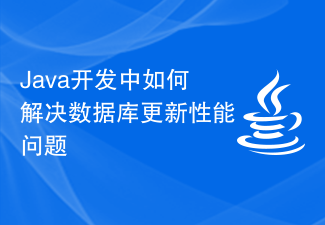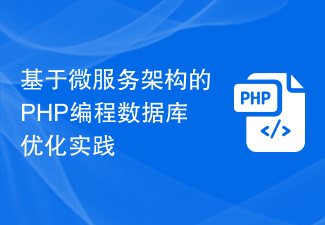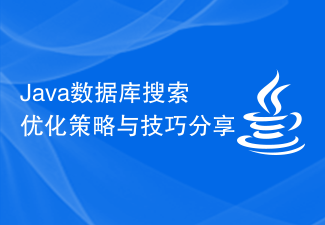Python is a high-performance, easy-to-learn, and rich language that has become the language of choice for many web development projects. Developers can use Python to quickly develop highly customized web applications, saving time and resources. However, a problem often encountered in Python web development is the poor performance of the code. To easily optimize Python web development, this article will introduce some best practices and tips.
- Caching mechanism
Using caching can significantly improve the performance of your application. Sometimes requests to process the same data are redundant, so caching can avoid this unnecessary work. In Python web development, there are many different caching solutions to choose from, such as Memcached, Redis, etc. You can choose the most appropriate caching scheme based on your application's needs and data types.
- Avoid overuse of ORM
ORM (Object Relational Mapping) is a tool that makes Python web development more efficient. It maps database tables to classes in Python, allowing programmers to access and manipulate the database using objects. However, overusing an ORM can cause your application to slow down. If using an ORM is not required, don't use it. Additionally, when accessing large amounts of data, it is better to use raw SQL statements instead of ORM to avoid performance impact.
- Using Gunicorn or uWSGI
Gunicorn and uWSGI are both Python web application servers that can significantly improve performance. This is because they use multiple processes to handle requests, so they can handle more requests and improve response times. It is important to note that the most suitable server should be selected based on the needs of the application and the machine configuration.
- Using asynchronous methods
Using asynchronous methods can make Python web development more efficient. Python 3.5 and later provides a library of asynchronous methods, aiohttp, which can greatly improve the performance of your applications. Asynchronous mode enables non-blocking IO, allowing the server to handle multiple requests at the same time. This results in significantly improved application responsiveness.
- Database Index
In Python web development, the use of databases is very common. However, if database indexes are not set up correctly, application performance may be affected. Database indexes can significantly speed up data retrieval of large data tables. Therefore, make sure you plan your database indexes properly before application development.
- Code Static Analysis
Using code static analysis tools can improve the performance of Python web applications. Code static analysis is the process of analyzing source code to find potential problems and errors. For example, PyLint can analyze the code to provide detailed information about problems in the code. This helps developers find problems in their code and optimize the code to improve performance.
Summary:
In Python web development, code performance is an important issue. Tips like using caching, avoiding overuse of ORMs, choosing the right server, using asynchronous methods, setting up database indexes, and using code static analysis tools can significantly improve the performance of your application. So, make sure to adopt these best practices to avoid performance issues and provide better solutions for Python web development.
The above is the detailed content of Optimization tips in Python web development. For more information, please follow other related articles on the PHP Chinese website!
 如何通过数据库优化提高Python网站的访问速度?Aug 07, 2023 am 11:29 AM
如何通过数据库优化提高Python网站的访问速度?Aug 07, 2023 am 11:29 AM如何通过数据库优化提高Python网站的访问速度?摘要在构建Python网站时,数据库是一个关键的组成部分。如果数据库访问速度慢,会直接影响网站的性能和用户体验。本文将讨论一些优化数据库的方法,以提高Python网站的访问速度,并附有一些示例代码。引言对于大多数Python网站来说,数据库是存储和检索数据的关键部分。如果不加以优化,数据库可能成为性能瓶颈。本
 如何通过使用复合索引来提高MySQL性能May 11, 2023 am 11:10 AM
如何通过使用复合索引来提高MySQL性能May 11, 2023 am 11:10 AM在MySQL数据库中,索引是一种非常重要的性能优化手段。当表中的数据量增加时,不适当的索引会导致查询变慢,甚至出现数据库崩溃的情况。为了提高数据库性能,在设计表结构和查询语句时需要合理地使用索引。而复合索引是一种较为高级的索引技术,通过将多个字段作为索引的组合来提高查询的效率。在本文中,将详细介绍如何通过使用复合索引来提高MySQL的性能。什么是复合索引复合
 从技术角度来看,为什么Oracle能够击败MySQL?Sep 08, 2023 pm 04:15 PM
从技术角度来看,为什么Oracle能够击败MySQL?Sep 08, 2023 pm 04:15 PM从技术角度来看,为什么Oracle能够击败MySQL?近年来,数据库管理系统(DBMS)在数据存储和处理方面扮演着至关重要的角色。Oracle和MySQL作为两款流行的DBMS,一直以来都备受关注。然而,从技术角度来看,Oracle相对于MySQL在某些方面更为强大,因此Oracle能够击败MySQL。首先,Oracle在处理大规模数据时表现出色。Oracl
 Linux系统中常见的数据库问题及其解决方法Jun 18, 2023 pm 03:36 PM
Linux系统中常见的数据库问题及其解决方法Jun 18, 2023 pm 03:36 PM随着计算机技术的不断发展和数据规模的不断增长,数据库成为了一项至关重要的技术。然而,在Linux系统中使用数据库还会遇到一些常见的问题,本文将介绍一些常见的Linux系统中的数据库问题以及它们的解决方法。数据库连接问题在使用数据库时,有时会出现连接失败或连接超时等问题,造成这些问题的原因可能是数据库配置错误或者访问权限不足。解决方法:检查数据库的配置文件,确
 Java开发中如何解决数据库更新性能问题Jun 29, 2023 pm 01:00 PM
Java开发中如何解决数据库更新性能问题Jun 29, 2023 pm 01:00 PMJava开发中如何解决数据库更新性能问题摘要:随着数据量的增加和业务的变化,数据库更新的性能问题成为了Java开发中一大挑战。本文将介绍一些常见的解决数据库更新性能问题的方法和技巧。关键词:Java开发,数据库,更新性能问题,解决方法引言:在大多数Java应用程序中,数据库扮演着重要的角色。数据库的性能直接影响了应用程序的响应速度和稳定性。而在实际开发中,数
 基于微服务架构的PHP编程数据库优化实践Jun 22, 2023 pm 02:27 PM
基于微服务架构的PHP编程数据库优化实践Jun 22, 2023 pm 02:27 PM随着互联网技术的快速发展和应用需求的日益增长,PHP的应用场景也越来越广泛。然而,在高并发、海量数据、复杂交互等场景下,传统的PHP编程方式已经不能满足开发需求。而微服务架构则成为了提升系统性能和可维护性的一种有效方式。基于微服务架构的PHP编程微服务架构(MicroserviceArchitecture)是一种面向服务的软件架构设计方式,它将应用按照业务
 技术同学必备的MySQL设计规约,助你成为数据库优化专家!Sep 09, 2023 pm 12:49 PM
技术同学必备的MySQL设计规约,助你成为数据库优化专家!Sep 09, 2023 pm 12:49 PM技术同学必备的MySQL设计规约,助你成为数据库优化专家!随着互联网的迅猛发展,大规模数据存储和高效查询成为了各行业发展的基础。而作为最流行的关系型数据库之一,MySQL在数据存储和查询方面具有强大的能力。然而,要充分发挥MySQL的优势,我们需要遵循一些设计规约和优化策略。本文将介绍一些技术同学必备的MySQL设计规范,并提供一些代码示例,助
 Java数据库搜索优化策略与技巧分享Sep 18, 2023 am 11:28 AM
Java数据库搜索优化策略与技巧分享Sep 18, 2023 am 11:28 AMJava数据库搜索优化策略与技巧分享在开发中,数据库搜索是非常常见的操作之一。然而,如果对数据库搜索不加优化,可能会造成严重的性能问题。本文将讨论一些Java数据库搜索优化的策略和技巧,并提供一些具体的代码示例。使用索引数据库索引是提高搜索性能的关键。通过在搜索列上创建索引,数据库可以快速定位到匹配记录。在使用索引时,应确保索引列是经常被搜索的,而不是很少被


Hot AI Tools

Undresser.AI Undress
AI-powered app for creating realistic nude photos

AI Clothes Remover
Online AI tool for removing clothes from photos.

Undress AI Tool
Undress images for free

Clothoff.io
AI clothes remover

AI Hentai Generator
Generate AI Hentai for free.

Hot Article

Hot Tools

Safe Exam Browser
Safe Exam Browser is a secure browser environment for taking online exams securely. This software turns any computer into a secure workstation. It controls access to any utility and prevents students from using unauthorized resources.

SecLists
SecLists is the ultimate security tester's companion. It is a collection of various types of lists that are frequently used during security assessments, all in one place. SecLists helps make security testing more efficient and productive by conveniently providing all the lists a security tester might need. List types include usernames, passwords, URLs, fuzzing payloads, sensitive data patterns, web shells, and more. The tester can simply pull this repository onto a new test machine and he will have access to every type of list he needs.

SublimeText3 Mac version
God-level code editing software (SublimeText3)

ZendStudio 13.5.1 Mac
Powerful PHP integrated development environment

SublimeText3 English version
Recommended: Win version, supports code prompts!






